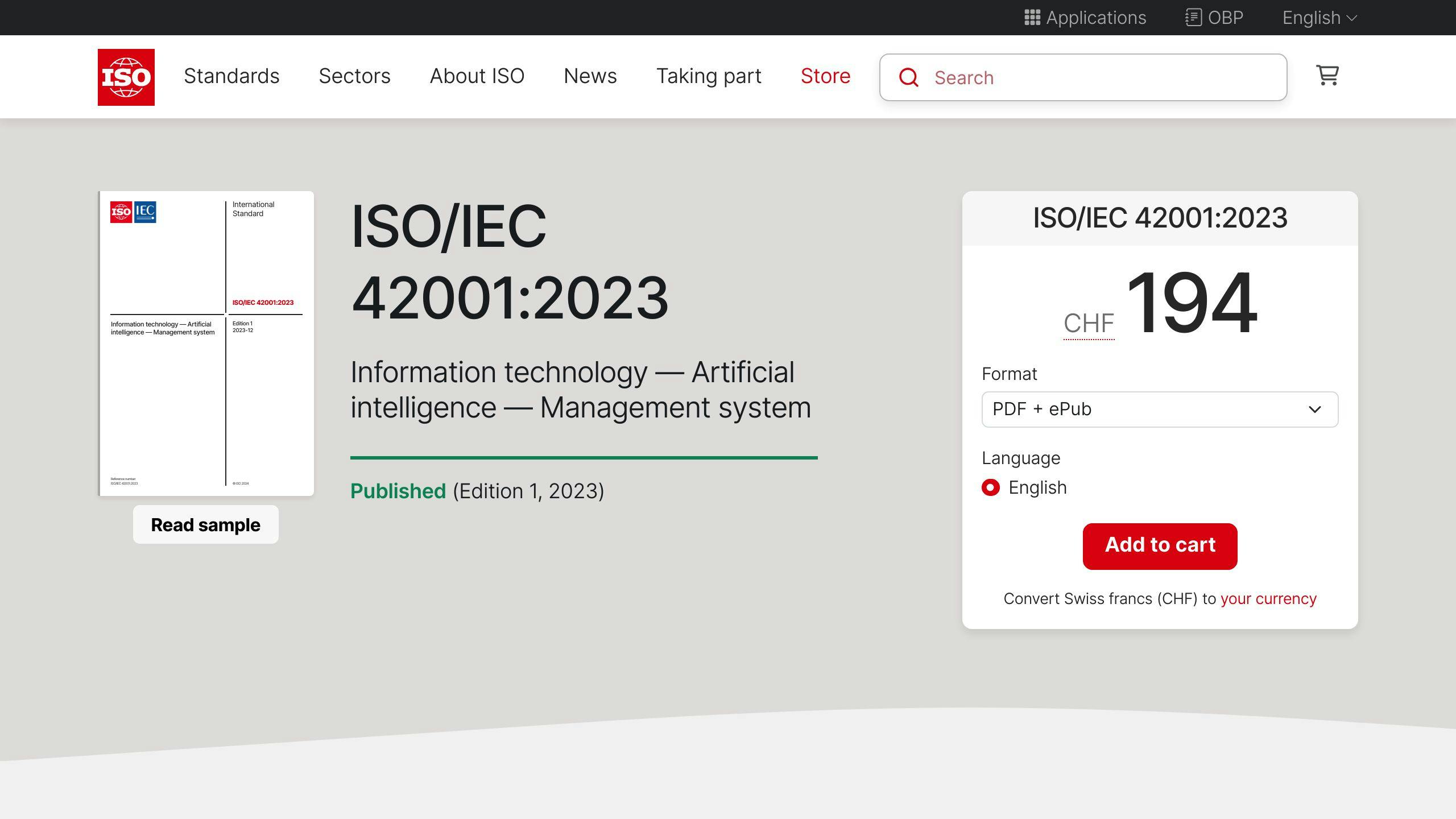ISO/IEC 42001 is the first global standard for managing Artificial Intelligence (AI) systems responsibly. Introduced in 2023, it ensures ethical, transparent, and accountable AI practices. Certification demonstrates a commitment to safeguarding privacy, managing risks, and building trust in AI technologies. Here's what it covers:
- Core Principles: Ethics, transparency, accountability, privacy, and security.
- AI Management System: Framework for governance, risk assessment, and performance tracking.
- Certification Steps: Define AI scope, set up AI management systems, and monitor continuously.
- Benefits:
- Builds trust with stakeholders.
- Improves governance and operational efficiency.
- Provides a competitive edge in the AI industry.
ISO/IEC 42001 helps organizations align with global standards for responsible AI development and maintain compliance through ongoing updates and audits.
Main Elements of ISO/IEC 42001

AI Management System Structure
The AI Management System (AIMS) outlined in ISO/IEC 42001 provides a framework for embedding AI governance into an organization's operations. It covers areas like system documentation, performance tracking, supplier management, and resource planning. This setup ensures clarity, efficiency, and alignment with the standard's requirements.
A key focus is on managing the AI lifecycle. Organizations are required to maintain detailed documentation, monitor performance metrics, and oversee AI suppliers. These steps promote accountability and help organizations meet the rigorous demands of ISO/IEC 42001.
By adopting this structured approach, companies can better assess and address the risks and effects of their AI implementations.
AI Risk and Impact Evaluation
Assessing the risks and impacts of AI is a core requirement. Organizations need to consider both technical aspects and broader societal effects. Regular monitoring helps to address new challenges as they arise.
This process involves detailed evaluations of how AI systems perform and their potential consequences for users. Transparency and accountability remain central to these assessments, ensuring systems are responsibly managed.
Ethical and Secure AI Practices
Organizations are expected to implement safeguards that uphold privacy, transparency, and ethical standards. This includes measures like data protection protocols, ongoing bias checks, and clear ethical guidelines for AI use.
Key areas to focus on include:
- Keeping thorough records of system design and operational decisions
- Regularly identifying and addressing algorithmic biases
- Establishing robust security measures
- Creating clear frameworks for ethical AI development
Continuous monitoring and updates based on new risks and best practices are essential. These measures are a critical part of achieving ISO/IEC 42001 certification, ensuring AI systems are developed responsibly and securely.
Steps to Obtain ISO/IEC 42001 Certification
Define Organizational Context and Scope
Start by evaluating your organization's AI landscape. Conduct a gap analysis to compare your current practices with the ISO/IEC 42001 requirements. This helps you create a clear plan for improvements. Align your AI objectives with relevant regulations and stakeholder expectations, using the gap analysis to pinpoint areas needing attention.
Document the scope of your AI systems, covering data processing activities, potential risks, and applicable regulations. Once you've outlined the scope and identified gaps, you can begin implementing the necessary structures to manage AI effectively.
Set Up AI Management Systems
Building an AI Management System (AIMS) requires thoughtful planning and execution. This system should integrate smoothly into your existing processes while meeting ISO/IEC 42001's specific standards.
Here are the key components to focus on:
| Component | Description | Implementation Focus |
|---|---|---|
| Policy Framework | Define governance policies | Ethics, compliance, risk management |
| Documentation System | Record processes and controls | Processes, procedures, controls |
| Resource Allocation | Assign roles and resources | Training, expertise, tools |
| Control Measures | Enforce controls | Security, privacy, performance |
Management plays a critical role in aligning the AI management system with the organization's strategy. They must ensure resources are available and communication channels are clear.
Ongoing Monitoring and Improvement
To maintain ISO/IEC 42001 certification, ongoing monitoring and updates are crucial. Set up tracking mechanisms to monitor the performance and compliance of your AI systems. Internal audits help verify compliance and highlight areas for improvement.
The improvement process includes:
- Regularly reviewing the effectiveness of AI systems
- Tracking performance metrics and compliance indicators
- Updating risk assessments to address emerging challenges
Keep detailed records of monitoring activities to provide evidence during annual audits. Certification is valid for three years, after which a full recertification audit is required. Continuous updates and improvements are key to staying certified and compliant over the long term.
Advantages of ISO/IEC 42001 Certification
Building Trust and Ensuring Transparency
Implementing the processes required for ISO/IEC 42001 certification helps organizations establish trust by promoting ethical AI practices and clear, transparent operations. This certification demonstrates a well-organized approach to managing AI risks and ensuring accountability. It includes documented protocols for decision-making, data handling, and risk management, which show stakeholders the organization's commitment to responsible AI use.
Strengthening Governance and Boosting Efficiency
The framework provided by ISO/IEC 42001 enhances governance while improving operational efficiency. It focuses on key areas such as risk management, resource allocation, process alignment, and performance tracking, all of which contribute to smoother operations and better outcomes.
| Governance Focus | Efficiency Gain |
|---|---|
| Risk Management | Identifying and addressing AI-related risks systematically |
| Resource Allocation | Optimizing the use of resources in AI development |
| Process Alignment | Ensuring AI processes align with business goals |
| Performance Tracking | Measuring and improving the effectiveness of AI systems |
These improvements often lead to lower operational costs and better decision-making across AI-related projects.
Gaining a Competitive Edge
Achieving ISO/IEC 42001 certification can elevate an organization’s position in the competitive AI landscape. It highlights a company’s dedication to ethical AI practices and responsible innovation, offering benefits such as:
- Demonstrating leadership in responsible AI development
- Enhancing credibility with regulators and stakeholders
- Building stronger relationships with partners
- Attracting collaborations for certified AI technologies
sbb-itb-f88cb20
Related video from YouTube
Resources for AI Management and Certification
Organizations aiming to achieve ISO/IEC 42001 certification can benefit from specialized tools and professional resources designed to streamline implementation and ensure compliance.
Best AI Agents

The platform Best AI Agents (bestaiagents.org) provides a curated directory of AI tools categorized by their purpose, such as automation, monitoring, analytics, and compliance management. These tools can simplify the certification process by improving efficiency and managing documentation effectively.
ISO Standards Guides
For ISO/IEC 42001 certification, key resources include official ISO materials, PECB training programs, and step-by-step implementation guides. These resources offer actionable strategies and insights to help organizations meet certification standards and prepare for audits.
Here’s an overview of available resources:
| Resource Type | Purpose |
|---|---|
| Official ISO Documentation | Guidelines outlining certification requirements |
| PECB Training Programs | Professional training and certification support |
| Implementation Guides | Step-by-step instructions for the certification process |
| Audit Preparation Materials | Tools to ensure readiness for certification audits |
Conclusion
ISO/IEC 42001 certification offers a structured approach for organizations to manage AI responsibly. It helps demonstrate a commitment to ethics, privacy, and fair practices, while its broad relevance builds trust across different industries.
By adopting ISO/IEC 42001, organizations can strengthen their risk management, improve ethical practices, boost their market reputation, and stay aligned with regulatory requirements. Achieving these benefits requires strong leadership, well-designed AI management systems, and access to expert resources.
Some key results of implementing the certification include:
- Better handling of AI-related risks
- Greater transparency in operations
- Increased trust among stakeholders
- Consistency with international standards
As AI technology progresses, ISO/IEC 42001 acts as a guiding framework for organizations aiming to prioritize ethical and transparent AI practices. Embracing this standard not only helps with compliance but also positions organizations as forward-thinking leaders in responsible AI development.


